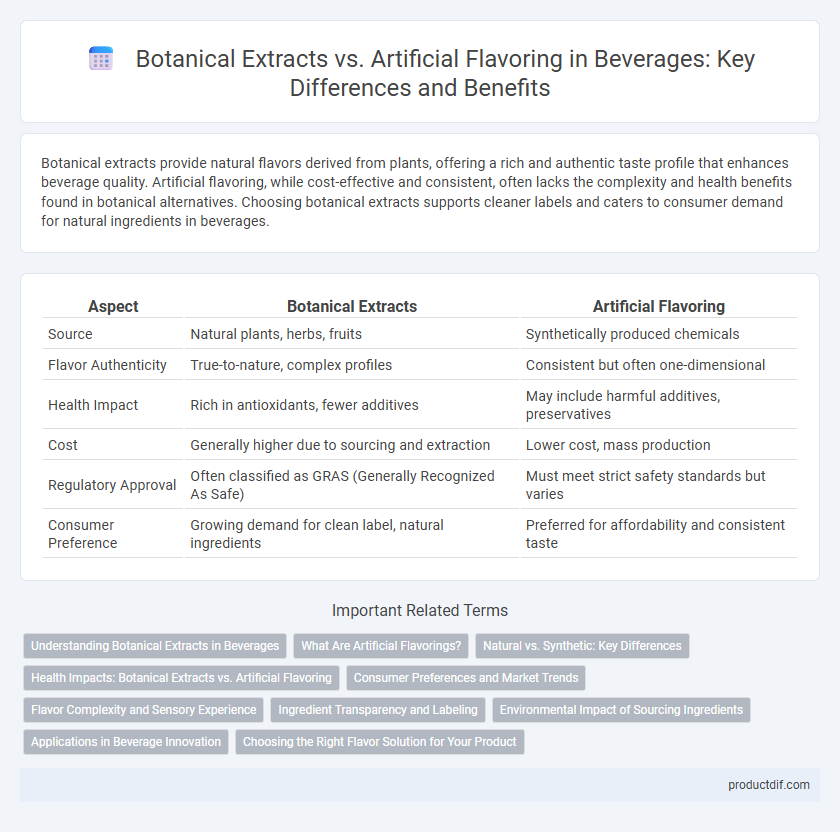Botanical extracts provide natural flavors derived from plants, offering a rich and authentic taste profile that enhances beverage quality. Artificial flavoring, while cost-effective and consistent, often lacks the complexity and health benefits found in botanical alternatives. Choosing botanical extracts supports cleaner labels and caters to consumer demand for natural ingredients in beverages.
Table of Comparison
| Aspect | Botanical Extracts | Artificial Flavoring |
|---|---|---|
| Source | Natural plants, herbs, fruits | Synthetically produced chemicals |
| Flavor Authenticity | True-to-nature, complex profiles | Consistent but often one-dimensional |
| Health Impact | Rich in antioxidants, fewer additives | May include harmful additives, preservatives |
| Cost | Generally higher due to sourcing and extraction | Lower cost, mass production |
| Regulatory Approval | Often classified as GRAS (Generally Recognized As Safe) | Must meet strict safety standards but varies |
| Consumer Preference | Growing demand for clean label, natural ingredients | Preferred for affordability and consistent taste |
Understanding Botanical Extracts in Beverages
Botanical extracts in beverages are derived from natural plant sources such as herbs, spices, fruits, and flowers, offering authentic flavors and potential health benefits. These extracts contain essential oils, antioxidants, and bioactive compounds that enhance taste complexity and contribute to product differentiation in the competitive beverage market. Unlike artificial flavoring, botanical extracts provide a clean-label appeal, attracting health-conscious consumers seeking natural ingredients in their drinks.
What Are Artificial Flavorings?
Artificial flavorings are chemically synthesized compounds designed to mimic natural flavors in beverages, providing consistent taste profiles at a lower cost. These flavorings often contain aroma chemicals such as esters, aldehydes, and ketones, engineered to replicate the sensory experience of fruits, spices, or herbs. Unlike botanical extracts derived from plants, artificial flavorings lack the complex phytochemical composition but offer enhanced stability and longer shelf life in drink formulations.
Natural vs. Synthetic: Key Differences
Botanical extracts are derived from natural plant sources, offering authentic flavors and potential health benefits due to their complex phytochemical profiles. Artificial flavorings are chemically synthesized compounds designed to mimic natural tastes but often lack the depth and nutritional value found in botanical extracts. The key differences lie in origin, complexity, and consumer preference for natural ingredients in beverage formulations.
Health Impacts: Botanical Extracts vs. Artificial Flavoring
Botanical extracts in beverages offer natural antioxidants, vitamins, and minerals that support immune function and overall health, while artificial flavoring often contains synthetic chemicals linked to allergic reactions and potential long-term health risks. Research highlights that botanical extracts provide anti-inflammatory and antimicrobial benefits absent in most artificial flavorings. Choosing botanical extracts over artificial flavoring enhances beverage quality by promoting wellness and reducing exposure to harmful additives.
Consumer Preferences and Market Trends
Botanical extracts, prized for their natural origins and health benefits, dominate consumer preferences in the beverage industry, leading to increased demand for clean-label products. Market trends indicate a significant shift towards authentic flavors derived from plant sources such as herbs, fruits, and spices, contrasting with synthetic artificial flavorings that face growing skepticism. Brands leveraging botanical extracts experience higher consumer trust and engagement, driving growth in sectors like functional beverages and organic juices.
Flavor Complexity and Sensory Experience
Botanical extracts offer a layered flavor complexity derived from natural sources, enhancing the sensory experience with nuanced aromatic profiles and authentic taste notes. Artificial flavoring typically provides a more uniform and predictable flavor, often lacking the depth and subtle variations found in natural botanicals. Consumers often perceive botanical extracts as more premium and engaging, contributing to a richer overall beverage experience.
Ingredient Transparency and Labeling
Botanical extracts in beverages offer consumers ingredient transparency by clearly listing natural sources on labels, enhancing trust and perceived quality. In contrast, artificial flavorings often appear as generic terms without detailed origin information, which can obscure ingredient clarity. Accurate labeling of botanical extracts supports informed choices by highlighting natural components and potential health benefits compared to synthetic additives.
Environmental Impact of Sourcing Ingredients
Botanical extracts are derived from natural plant sources, promoting sustainable harvesting practices that often support ecosystem preservation and biodiversity. In contrast, artificial flavoring relies on chemical synthesis processes that typically consume more non-renewable resources and generate higher carbon emissions. The environmental footprint of sourcing botanical extracts tends to be lower, with reduced soil degradation and water pollution compared to the extraction of synthetic flavor compounds.
Applications in Beverage Innovation
Botanical extracts, derived from natural plant sources, offer complex flavor profiles and health benefits that enhance beverage innovation with authenticity and consumer appeal. Artificial flavoring provides cost-effective, consistent taste replication but often lacks the depth and perceived naturalness valued in premium beverage markets. The integration of botanical extracts drives innovation in functional beverages, craft sodas, and wellness drinks, positioning brands to meet rising demand for clean-label, natural ingredients.
Choosing the Right Flavor Solution for Your Product
Botanical extracts offer natural, complex flavor profiles that enhance beverage authenticity and appeal to health-conscious consumers, while artificial flavoring provides consistent taste, cost efficiency, and longer shelf life. Selecting the right flavor solution depends on your product's target market, regulatory requirements, and desired sensory experience. Prioritize botanical extracts for premium, clean-label beverages, and artificial flavoring for mass production with strict cost controls.
Botanical Extracts vs Artificial Flavoring Infographic

 productdif.com
productdif.com